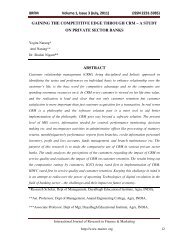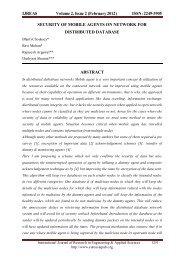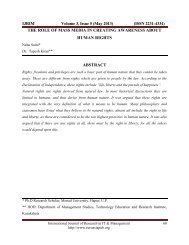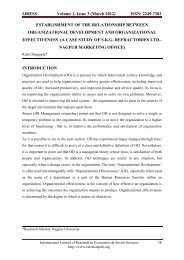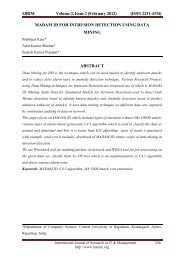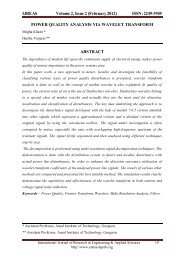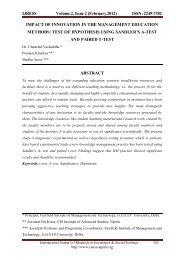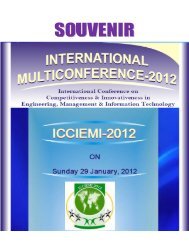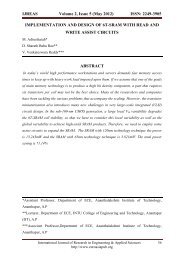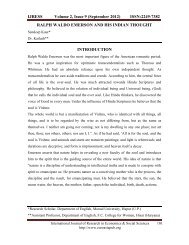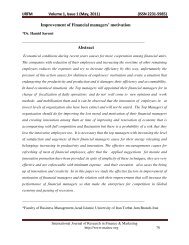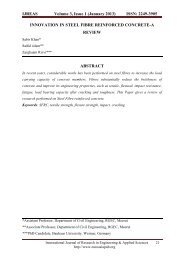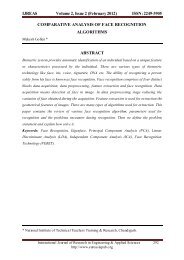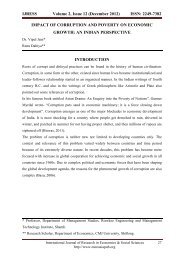the mayor and tess: mounting will, dismounting fate elements of fate ...
the mayor and tess: mounting will, dismounting fate elements of fate ...
the mayor and tess: mounting will, dismounting fate elements of fate ...
You also want an ePaper? Increase the reach of your titles
YUMPU automatically turns print PDFs into web optimized ePapers that Google loves.
IJREAS Volume 3, Issue 6 (June 2013) ISSN: 2249-3905The opening <strong>of</strong> <strong>the</strong> novel establishes a situation which seems to <strong>of</strong>fer hope for Herchard'ssuccess following <strong>the</strong> brief prefatory account <strong>of</strong> his economic <strong>and</strong> moral nucleus <strong>and</strong> his <strong>will</strong> tomake a start in a new direction" (The Mayor, 115). He is shown continuously to grasping <strong>the</strong>power. Hardy uses both action <strong>and</strong> authorial comments to shift reader’s impression <strong>of</strong>Henchard's moral structure in a curve which parallels his economic rise <strong>and</strong> fall against Farfrae.His <strong>will</strong> keeps moving to serve what seems to be larger moral order in <strong>the</strong> world. He himselfcomes to feel some intelligent power 'bent on punishing him." (The Mayor, 271) against his <strong>will</strong>.The au<strong>the</strong>nticity <strong>of</strong> a moral intelligence beyond man's power to control is verified in <strong>the</strong> heroicimagination <strong>of</strong> Henchard himself. Henchard's career st<strong>and</strong>s out as a testimony for <strong>the</strong> familiar<strong>and</strong> hard beliefs that <strong>the</strong> wise <strong>and</strong> <strong>the</strong> good shall prosper <strong>and</strong> wicked <strong>and</strong> rash shall fall against<strong>the</strong>ir <strong>mounting</strong> <strong>will</strong>. Hardy clearly intends to leave no doubt about his rise <strong>and</strong> fall. "On <strong>the</strong> dayalmost at that time- he passed <strong>the</strong> ridge <strong>of</strong> prosperity <strong>and</strong> honour <strong>and</strong> began to descend rapidly on<strong>the</strong> o<strong>the</strong>r side" (The Mayor, 311). Therefore, Hench<strong>and</strong>'s terrible retrogression obeys a law asdistinct <strong>and</strong> irrefutable in its logic as to suggest an origin more supernatural, which is called <strong>fate</strong>,than natural. Paterson recounts, "Reduced to <strong>the</strong> humble trade with which he began, discarding<strong>the</strong> shabby genteel suit <strong>of</strong> cloth <strong>and</strong> <strong>the</strong> rusty silk hat which had <strong>the</strong> emblem <strong>of</strong> his illegitimatepower, taking again to <strong>the</strong> drink he had twenty years before his repudiated, leaving exactly as hehad entered it, revisiting Waydon-Priors. The scene <strong>of</strong> <strong>the</strong> original crime <strong>and</strong> dying at last,broken in body <strong>and</strong> spirit, on <strong>the</strong> barren wastes <strong>of</strong> Edgon Heath, Henchard travels with everystage <strong>of</strong> his decline <strong>and</strong> fall <strong>the</strong> road by which he had come, embraces with every step <strong>the</strong> past hehad denied…" (161). Despite all <strong>the</strong> impossibilities, Hardy's genius asserted itself in <strong>the</strong> making<strong>of</strong> a Michael Henchard as a man <strong>of</strong> strong <strong>will</strong>. Having suffered odds <strong>and</strong> vicissitudes, he movescloser to Aristotle's definition <strong>of</strong> a tragic hero. Henchard undergoes rebuffs that appear in excess<strong>of</strong> what his original crime dem<strong>and</strong>s, <strong>and</strong> his punishment appears more than what a basicallydescent man deserves.I can go alone as I deserve an outcast <strong>and</strong> a vagabond. But my punishment is notgreater than I hear (The Mayor, 325).In this way, <strong>the</strong> preceding argument establishes that <strong>the</strong> nail, portrays a battle between man's <strong>will</strong><strong>and</strong> <strong>the</strong> nature because man can never be sure <strong>of</strong> himself like <strong>the</strong> Greek hero.Like that <strong>of</strong> The Mayor Hardy has been successful in portraying Tess as a girl who fights withher circumstances but gets defeated by <strong>the</strong> <strong>fate</strong> in Tess <strong>of</strong> D’urberville. Douglas Brown says,International Journal <strong>of</strong> Research in Engineering & Applied Sciences 45http://www.euroasiapub.org



